All signs were pointing to enormous interest in the campaign as Democrats prepared this week to stage their most unusual convention in memory, a four-night virtual gathering featuring speeches by Joe Biden, his VP pick Kamala Harris, Barack and Michelle Obama and Hillary and Bill Clinton.
Democrats seem energized by the choice of Harris and by Biden’s edge in the polls. But they are also nervous about whether they can prevail in an election held in the middle of a pandemic and with an incumbent trying to undermine mail-in voting. Pew also found that nearly half of voters polled think casting their ballot this year will be difficult.
DeJoy has suggested that the service may no longer expedite election mail, which typically goes at a bulk rate of 20 cents. “There’s a way to utterly frustrate DeJoy’s suggestion,” Andelman pointed out. “Every voter should put a 55-cent stamp on his or her return envelope, no matter if it is already pre-printed with bulk postage by their election board.”
Geraldine Lampert argued that another way to get creative about the voting challenge is
to draw private carriers such as FedEx and UPS into the process.
“Over the past few months,” wrote CNN legal analyst
Elie Honig, “Trump has made his stance clear, launching
increasingly frantic — and wildly inaccurate, almost hallucinogenic — pre-emptive attacks on mail-in voting.” But since elections are controlled by the states, Trump can only indirectly affect them, Honig noted. Trump’s campaign and the Republican National Committee have gone to court in an effort to get states to limit access to voting by mail. The two parties are “braced for war,” hiring “teams of election law specialists” and setting aside “tens of millions of dollars to finance legal battles unfolding around the country.”
Kamala Harris
Joe Biden kept it a secret till the last minute but his choice of a running mate turned out to be the candidate most people considered the favorite: Sen. Kamala Harris.
Trump supporters couldn’t seem to decide whether to label Harris, the former California Attorney General, as too tough on crime or, in the words of Fox News’ Sean Hannity, as having a “radical extremist record.”
Jen Psaki noted that “Harris is not only a historic pick, as the first Black and Asian American woman to be on a national ticket for either party, but she is young, tough as nails (just ask Attorney General Bill Barr, or Biden for that matter) and
prepared to do the job on day one.”
As historic as her selection was, Harris was also the safe choice, wrote
David Axelrod: “People familiar with research the campaign undertook to inform its decision told me
voters viewed her as among the most qualified to be president on Day One — a key positive, given Biden’s status as potentially the oldest politician to ever serve as president.”
Biden and Harris have something to prove, wrote
Jeff Yang. “The symbolism of this ticket is undeniable,” he said. “
Voters, especially progressive voters, will now be looking for the substance behind it — how the ticket intends to address a pandemic that, as Harris noted, is killing an American every 80 seconds; how it will reform health care; how it will protect women’s right to choose, root out systemic racism, protect voting rights and reaffirm this nation’s commitment to immigrants.”
On the right, commentator
Scott Jennings pointed out that Harris’ own campaign for president was “a short ride…several primary rivals like Bernie Sanders outlasted her because their authenticity was perceived to be far greater.
But winning the vote of one person — Joe Biden, in this case — was easier than winning the millions of votes necessary to be the nominee herself.”
The birther myth, part 2
Harris was born in Oakland, California, and is fully qualified to run for vice president. But that didn’t stop some Republicans from questioning her citizenship, much as Trump had perpetuated the “birther” lie that former President Barack Obama also wasn’t qualified. “For the first Black President, and now for the first Black nominee for vice president, the signal is clear: they’re not ‘one of us,'” wrote Douglas Heye, a Republican strategist.
His advice to his fellow GOP members: “Stay far away from the ‘birther,’ 9/11 truther and other conspiracy nonsense —
except to condemn it. It hasn’t helped the party in recent years — and it won’t now.”
Trump’s executive actions
With Congress deadlocked on the terms of a new Covid-19 economic relief package, President Trump issued four executive actions a week ago, including one that could defer payment of payroll taxes for some employees.
Paul Begala called it
“a declaration of war on Social Security and Medicare” and urged Democrats to campaign on it. “The payroll tax funds those two vital and beloved programs. When you suspend collection of the revenue that funds those two programs, you endanger their viability.”
In the Washington Post,
Marc Thiessen hailed Trump’s actions as a “big political win” and said Democrats’ failure to compromise on the aid package paved the way. “Because Trump acted unilaterally,
Democrats get no credit for extending the relief. Their refusal to compromise means they got none of their priorities approved,” he wrote. “Their only recourse now is to sue Trump to stop him from providing the American people with tax relief, student-loan deferments and enhanced unemployment benefits.”
‘The wind is at our back’
Ahead of Monday’s start of the Democratic convention, our political commentary editor Yaffa Fredrick asked 10 leading figures for their view of the party’s future.
Keith Boykin, a former aide in the Bill Clinton White House, wrote, “In the old days, Democrats were ashamed to be called ‘liberal.’
These days, 76% of Democrats say they’d vote for a socialist for President. And even after weeks of civil unrest that would have spooked fearful Democrats in years past, 86% support the protests against police violence. The wind is at our back. As America becomes more diverse and open-minded, Democrats have won the popular vote in six of the last seven presidential elections, and Republicans have had to resort to voter suppression attempts and gerrymandering to stay in power.” (You can also read
the views of
Jess McIntosh,
Jennifer Granholm,
Abdul El-Sayed,
Van Jones, Paul Begala, Jen Psaki and
Mitch Landrieu.)
CNN Opinion’s special Democratic convention coverage continues all week.
Covid-19 response goes wrong
Health experts have repeatedly stressed: More testing for Covid-19 is key to safely reopening the economy. “This is how other countries reined in their outbreaks — testing, plus doggedly tracing and isolating people who are infected,” wrote infectious disease expert Kent Sepkowitz.
But in the US, President Trump gave “dangerous and deluded advice” to “slow the testing down, please.” And now, in a nation with about a quarter of the world’s recorded cases of the disease, testing declined for several weeks. “Here we are with a lethal pandemic and, right before our very eyes, there has been a deliberate decrease in our attempt to measure and control the outbreak…
In March, 25-year-old
Annika Olson wrote an
open letter at CNN Opinion pleading with her generation to protect each other and their families by social distancing.
It didn’t persuade enough people, she noted in
a new op-ed. “As I am writing this, there are throngs of people at my apartment building’s pool — no masks and no physical distancing…. Young people between 20 and 40 are a significant portion of the growing number of cases, and many more may be contagious even if they don’t show any symptoms.”
Peer pressure and a feeling of invincibility are factors in the failure to follow public health advice. Yet it’s not hopeless and we should keep trying to spread the message, but in different ways, Olson concludes.
A Georgia high school student, Hannah Watters, has been getting threats since she posted photos on Twitter that showed students flouting social distancing guidelines at her school.
On the first day of school in Cherokee County, Georgia, teacher Tracy Strange wasn’t in her classroom teaching high school students the basics of anatomy,
Thomas Lake wrote. “She never left the house. Instead she drank her coffee alone and
worried about the other teachers. And she cried.” Strange, who has a heart ailment and a lung condition, had to retire at the age of 53 for fear of contracting Covid-19 or bringing it home to her in-laws, who are in their 70s and have underlying health conditions.
Suffrage struggle’s little known chapter

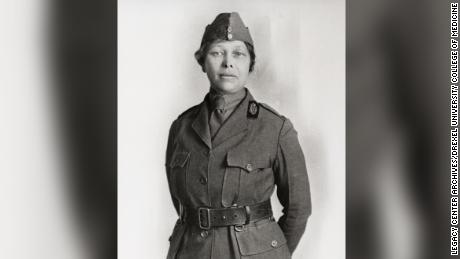
Dr. Nellie N. Barsness, 1918
They were decorated by European governments for their service, but the American suffrage advocates who volunteered to provide overseas medical care in World War I are largely unheralded in their own country.
Kate Clarke Lemay tells their story, noting that women fighting for the right to vote “
seized on the war as an opportunity to bolster their cause, and in 1918, organized the Women’s Oversea Hospitals Unit to serve in France. They were responding to the powerful antisuffragist argument that declared that women should not have the right to vote because they could not prove themselves as full citizens — by fighting for their country.” With the ratification of the 19th Amendment 100 years ago this month, these women and many other suffrage activists realized their goal.
Don’t miss:
AND…
‘Definite chickenality’
“We did not get the chickens because the pandemic was coming,” wrote poet Tess Taylor. She and her husband had promised their kids pets, and he’s allergic to dogs, cats and rabbits.
There are limits to the positive benefits any pets can provide in this time of physical distancing, remote schooling and working from home.
“It’s a world of desperate and stressed out parents, of children losing social, emotional and physical ground,” Taylor wrote. “Kids are often lonely and isolated and tweaked out and afraid.”
But she was able to report: “Every day the kids would go and sit by the box, which later became a small indoor coop, to watch something grow. They had a space to observe life with patience and wonder.”
“My son started a chicken log — noting each aspect of our four chicks’ development. He noted that chickens had ‘definite chickenality,’ and he wasn’t wrong: Indigo’s a rebel, always trying to fly the coop; Tulip’s a people pleaser and lives for treats; Charlotte is mellow and rolls around, cooing. Dahlia squawks loudest when the others are gone — in another life, she was a sheepdog.

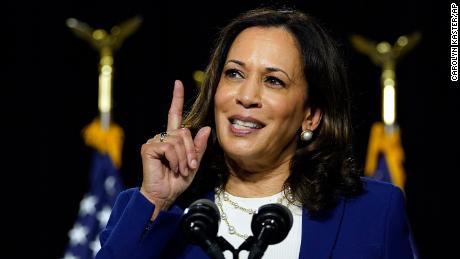

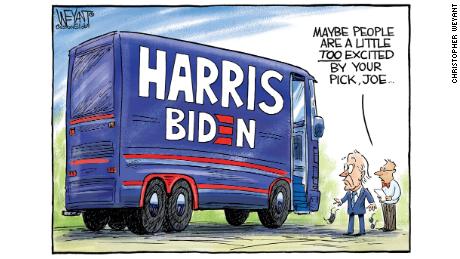

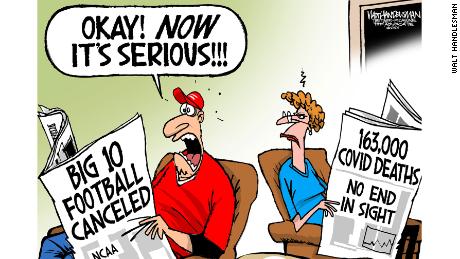

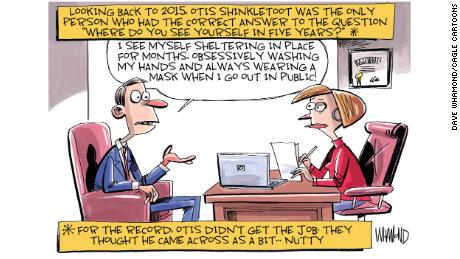



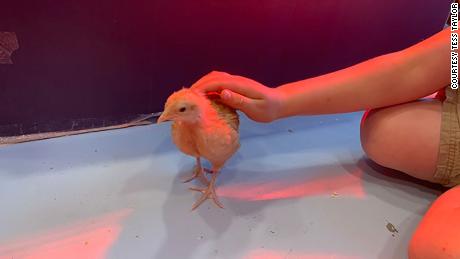
![]()


